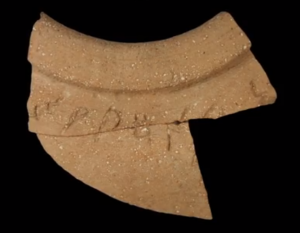 JERUSALEM – A renowned Israeli archaeologist has announced the discovery of an earthenware jug from the Davidic era that features the oldest alphabetical text ever unearthed in Jerusalem.
JERUSALEM – A renowned Israeli archaeologist has announced the discovery of an earthenware jug from the Davidic era that features the oldest alphabetical text ever unearthed in Jerusalem.
Dr. Eilat Mazar is a professional archaeologist with a track record of remarkable Israeli discoveries, especially in and around Jerusalem. In 2005, she uncovered several remnants believed to be from the palace of King David. In 2007, Mazar discovered possible remnants from the wall built in Nehemiah’s time around Jerusalem, and in 2010 she claimed to have found ancient city walls built in the 10th century during King Solomon’s reign.
Unlike many secular scientists, Mazar has followed in the footsteps of her grandfather, archaeologist Benjamin Mazar, in using the Bible as a guide for her research. Following her 2005 discovery of remains from King David’s palace complex, she published a lengthy article in Biblical Archaeology Review, in which she explains how the Bible played an integral role in her historic findings.
“The Biblical narrative, I submit, better explains the archaeology we have uncovered than any other hypothesis that has been put forward,” she wrote. “Indeed, the archaeological remains square perfectly with the Biblical description.”
A 2006 article about Mazar’s archaeological work published in Moment Magazine describes how she likes to keep a laptop, various papers, and a “heavily marked Bible” on her desk.
“One of the many things I learned from my grandfather was how to relate to the Biblical text,” Mazar stated. “I work with the Bible in one hand and the tools of excavation in the other. That’s what Biblical archaeologists do. The Bible is the most important historical source and therefore deserves special attention.”
Once again, Mazar’s archaeological strategies have paid off, as she recently announced the discovery of several ceramic jar pieces which were most likely created during the time of Solomon in the 10th century B.C. One of the fragments features writing engraved on its side, making it the oldest alphabetic text ever found in the Jerusalem area.
According to experts, the letters on the jar fragment are not Hebrew, but rather an early form of Canaanite writing, perhaps written by a member of a neighboring tribe. While the exact meaning of the inscriptions remain a mystery, some have speculated that they might be communicating either the name of the pot’s owner or the contents of the jar.
All these jar pieces were discovered in an excavation site located in a national park near Jerusalem’s Temple Mount. Mazar is the head archaeologist of the project, but the East Jerusalem Development Company, the Israel Antiquities Authority, and the Israel Nature and Parks Authority were all involved with the excavation, according to Live Science.
Although some questions remain unanswered, Mazar says that she is thrilled with the discovery. In a 7-minute video detailing her find, Mazar once again gives credit to the Bible’s reliability.
“This is a very interesting and very important inscription found in Jerusalem,” she explains, “showing us so realistically what actually the Bible tell us all along, by telling us stories, things that happened, names, titles of officials, et cetera. It’s all there. But now our archaeology comes in and gives it some actual shape!”
Photo: Eilat Mazar
Become a Christian News Network Supporter...


